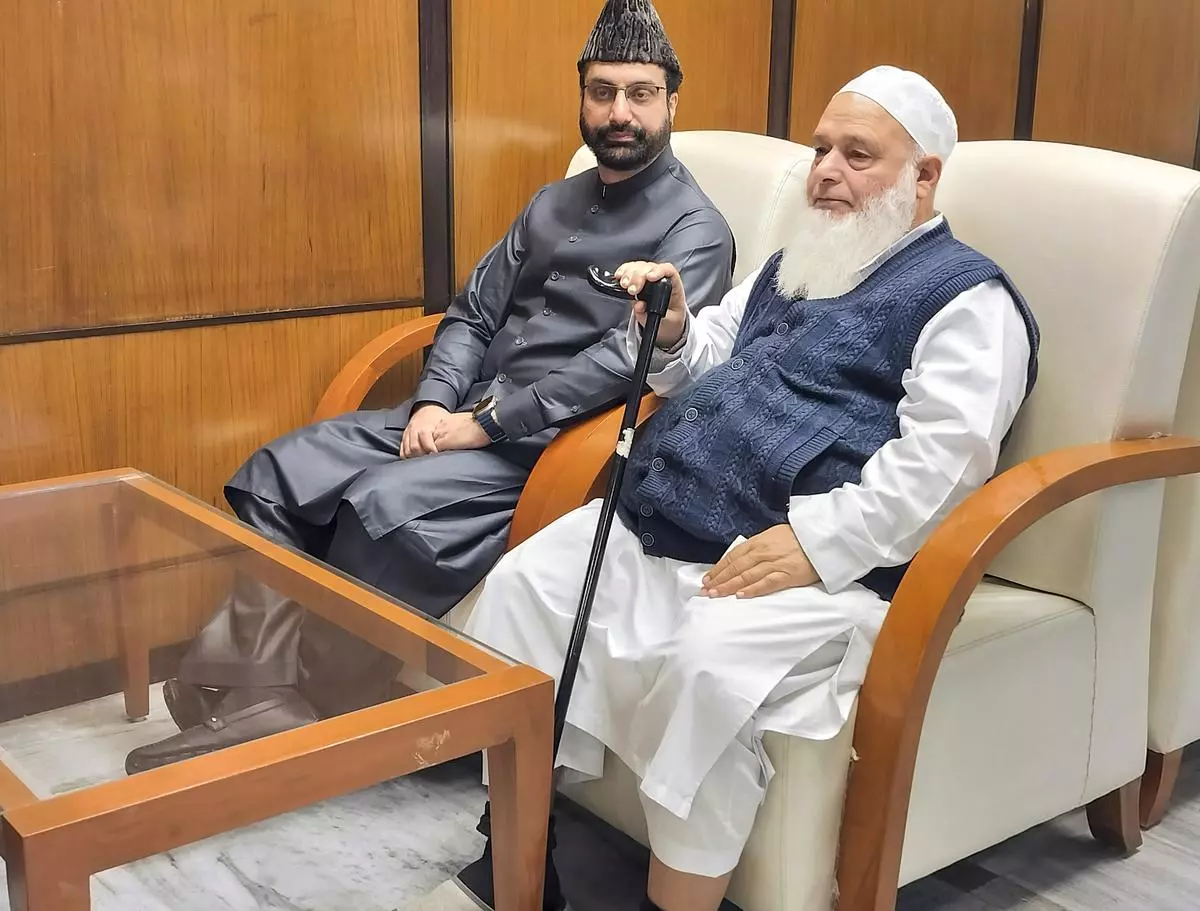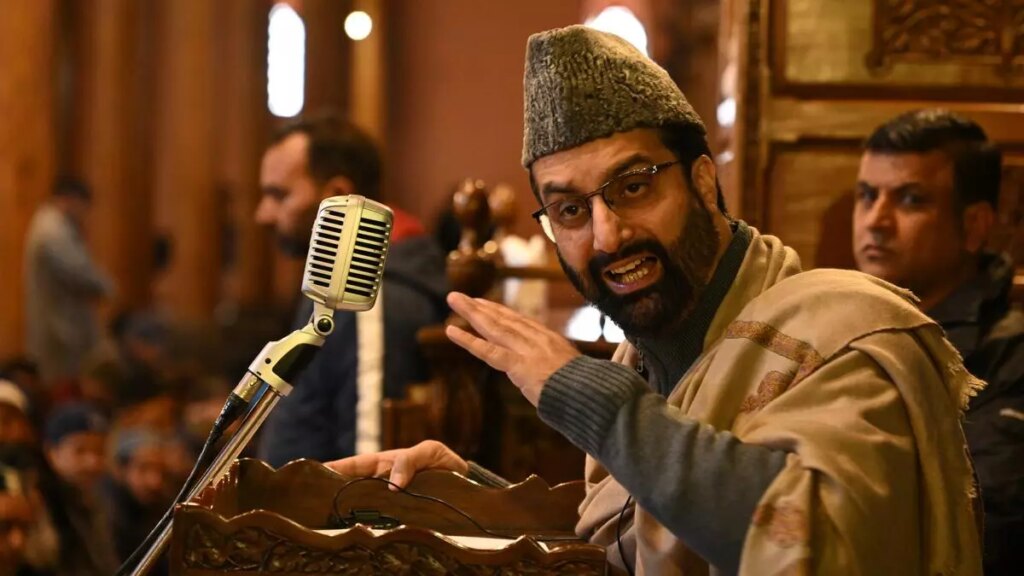Every Friday since 2019, Mirwaiz Umar Farooq, Kashmir’s top cleric and separatist, has been unsure if he will be allowed to visit Jamia Masjid—Kashmir’s grandest and most influential mosque—where he delivers sermons. Since the BJP-led Union government erased Jammu and Kashmir’s statehood, he has had to seek court intervention twice just to travel barely 5 km from his Srinagar home. But today, his circumscribed life appears to be changing.
Farooq’s movements are no longer quite as restricted, at least outside Kashmir. On January 24, he arrived in New Delhi, where he met members of the Kashmiri Pandit community, Muslim religious leaders, and Srinagar’s parliamentarian, Aga Ruhullah Mehdi. His primary focus, however, remained a Constitutional issue: the Waqf (Amendment) Bill.
Appearing before the Joint Parliamentary Committee (JPC) led by BJP MP Jagdambika Pal, Farooq raised several concerns. He met the committee as the patron of the Mutahida Majlis-e-Ulema, a collective of various religious bodies from Jammu and Kashmir, but Farooq also leads the moderate faction of Hurriyat, a separatist conglomerate that has become virtually defunct following the Centre’s crackdown.
His Delhi trip was significant: this was the first time a separatist was engaging directly with a Parliamentary committee on a legislative issue, signalling the possibility of Delhi’s engagement with Kashmir’s separatist camp.
Political observers believe that Farooq’s Delhi trip suggests a “pragmatic reassessment” and an attempt to “navigate the new political reality” where both mainstream and separatist forces have been weakened to a significant extent.
Strategic recalibration
Farooq is not Kashmir’s only separatist leader. But among separatists operating under the umbrella of the All Parties Hurriyat Conference (APHC)—a coalition of disparate ideologies— Farooq has been one among a few moderate forces advocating peaceful means to resolve the political crisis. Despite criticism from hardliners, he has repeatedly shown a willingness to engage in dialogue with the Centre.
Also Read | This mandate is against the unilateral changes initiated by New Delhi after 2019: Mirwaiz Umar Farooq
Farooq, who belongs to one of Kashmir’s most influential families, was thrust into the political and religious leadership of Kashmir’s grand priesthood soon after his father was assassinated in 1990, a period of intense militancy and political turmoil. In the years that followed, he assumed the chairmanship of the Hurriyat Conference. However, since India’s sweeping crackdown on separatist groups in 2019, the Hurriyat has struggled to barely exist.
“The abrogation of Article 370 significantly altered the political dynamics in Jammu and Kashmir, weakening both mainstream and separatist political forces, particularly the Hurriyat Conference,” says a Kashmiri political observer, who wished not to be named. “Consequently, New Delhi’s post-abrogation policy towards the Hurriyat has been one of containment rather than engagement, diminishing the movement’s influence and operational capacity.”
Therefore, observers believe that Farooq’s Delhi trip signals a possible strategic recalibration. “His clearance for travel indicated a potential softening of New Delhi’s approach towards moderate separatist leaders, hinting at a shift from strict containment to a more flexible posture,” says the observer. “It also allowed him to assess the mood within India’s political leadership concerning future engagement.”
After the scrapping of Jammu and Kashmir’s special status, Farooq was placed under house arrest for four years, part of the state’s efforts to marginalise separatist voices. “While his release and travel permissions indicate a degree of recognition of his influence in Kashmir, they do not necessarily signal a complete policy shift in New Delhi. Rather, they reflect a tactical approach where engagement with moderate leaders is permitted while the hardline factions remain suppressed.”
However, the veteran political observer Noor Ahmad Baba believes otherwise. “Apart from his political role, Farooq serves as the Mirwaiz of Kashmir, a position of community leadership. In the context of the change after 2019, he appears to have shifted his focus more towards social and community issues affecting Kashmiri Muslims,” Baba tells Frontline.
Futility of a face-off
Known for his largely peaceful approach, Farooq has, after 2019, been cautious in his statements, sending a message across the Valley that separatists might have lost their relevance among the people. With their traditional avenues curtailed, former separatists have increasingly engaged with the mainstream political framework, either by participating in elections or by seeking legislative solutions to autonomy-related concerns, even as the Modi government continues to keep the issue of statehood on ice.
In 2024, the Jamaat-e-Islami, a banned Islamic group that had for three decades told Kashmiris not to participate in elections, supported a few “independent” candidates for the Assembly election in Jammu and Kashmir.
“The reality right now is that there is no space for separatist politics,” Rekha Choudhary, a former professor of political science at Jammu University, tells Frontline. “In recent times, even separatist [groups] such as Jamaat-e-Islami shifted their approach by contesting elections because there is no longer any room for separatist politics.”

Mirwaiz Umar Farooq, left, the religious head of Kashmir, with Maulana Rehmatullah of Bandipora as they wait to appear before the parliamentary panel on Waqf Amendment Bill, at Parliament Annexe, in New Delhi on January 24, 2025.
| Photo Credit:
Sagar Kulkarni/PTI
A moderate politician from Kashmir, requesting anonymity, tells Frontline that some space had indeed been created now for the separatists. “This could be because we [moderates] have always advocated a dialogue with the government,” says the politician. “Both parties have realised that a face-off won’t produce a viable way out of the situation. So, why shy away from dialogue.”
The politician adds that the moderate group unanimously supports Farooq’s call for engagement with Delhi: “But Delhi hasn’t really initiated any broad dialogues yet. Maybe it realises that we are still a weak structure and that it has the upper hand.”
Another moderate, however, offers a different view. “Delhi is trying to create a mirage about moderates in Kashmir. There is no concrete approach being adopted toward us. The talks that are happening are entirely one-sided, with no points being heard from our side. There is still a lack of trust from Delhi. Forget Hurriyat members, Delhi does not even trust the elected government.”
The current approach of the BJP-led government is vastly different from that of previous administrations. After 2019, observers point out that the government’s consistent policy has been one of zero tolerance for any form of separatism in the Valley. This is why Choudhary believes that Farooq’s trip to Delhi could be a strategic move, as he has no other option if he still wants to be perceived as a leader of the Kashmiris. “In such a situation, he must align himself with something that is acceptable within the current landscape, allowing him room to manoeuvre,” she says. “He cannot be a separatist and survive in Kashmir’s politics right now.”
Hurriyat’s marginalisation, the legal actions against its leadership, and the suppression of political dissent have forced separatists to adapt to the post-Article 370 framework. So, “Farooq’s recent moves signal an attempt to navigate these new realities, balancing historical separatist ideals with contemporary political pragmatism,” says a political observer. “It can be an effort on his part to reassert his political relevance in the changing political dynamics of the region.”
This is not the first time that the separatists in Kashmir have adjusted their approach in response to political transitions. During Atal Bihari Vajpayee and Manmohan Singh’s governments, moderate Hurriyat leaders engaged with the Centre, exploring dialogue as a means of resolving the problem. However, after 2019, the Hurriyat has faced an unprecedented crisis, with most of its top leadership detained and political space shrinking in the region.
Out of his shell
In a rare instance of separatist and mainstream leaders finding common ground, Farooq also met the MP from Srinagar and outspoken National Conference (NC) leader, Aga Ruhullah Mehdi, in Delhi. As per media reports, the duo discussed the proposed amendments to the Waqf Bill, the religious freedom of Muslims in the country, the post-2019 situation in Jammu and Kashmir, and the plight of Kashmiri youth languishing in jails. “Farooq’s engagement with mainstream political figures, particularly his meeting with Mehdi, marks a departure from conventional separatist strategies,” the observer notes.
Also Read | Omar Abdullah’s pragmatism, Ruhullah Mehdi’s dissent, and National Conference’s balancing act
Historically, the Hurriyat—especially its hardline factions—has distanced itself from mainstream parties such as the NC and the People’s Democratic Party (PDP), viewing them as enablers of the Centre’s approach in Kashmir. In the past, even as a moderate leader, Farooq rarely engaged with elected political figures.
Choudhary believes the new deliberations might be the result of “encouragement”. “It can be a two-way process,” she notes. “[Farooq] cannot be taking this initiative on his own. He might have been encouraged to do this, as there is a genuine space where he can be seen alongside other Muslim leaders of India.” Choudhary adds, “He has certainly stepped out of the shell of being solely a Kashmiri leader, and has aligned himself with a broader issue.”
But whether these engagements will lead to a sustainable political understanding or merely represent tactical manoeuvres in response to state pressure, remains to be seen.
Zaid Bin Shabir is a journalist based in Srinagar.
Source:https://frontline.thehindu.com/politics/kashmir-mirwaiz-umar-farooq-hurriyat-delhi-visit-waqf-bill-bjp-jpc/article69275472.ece

